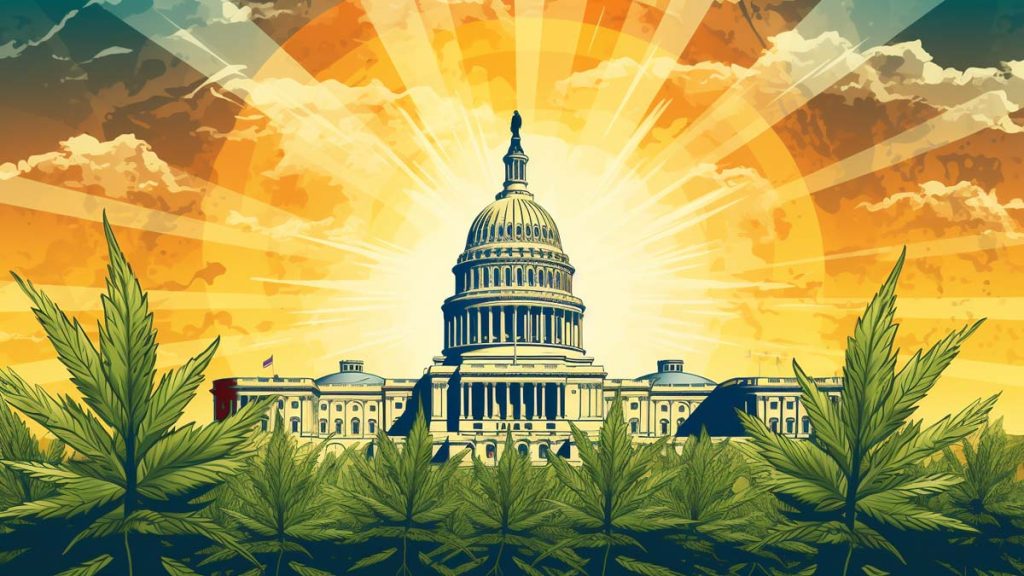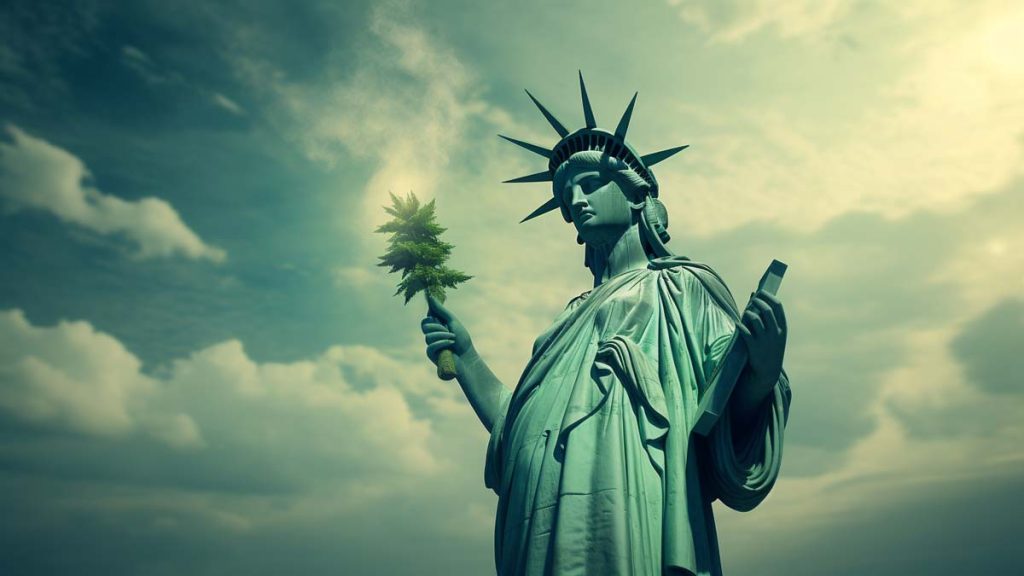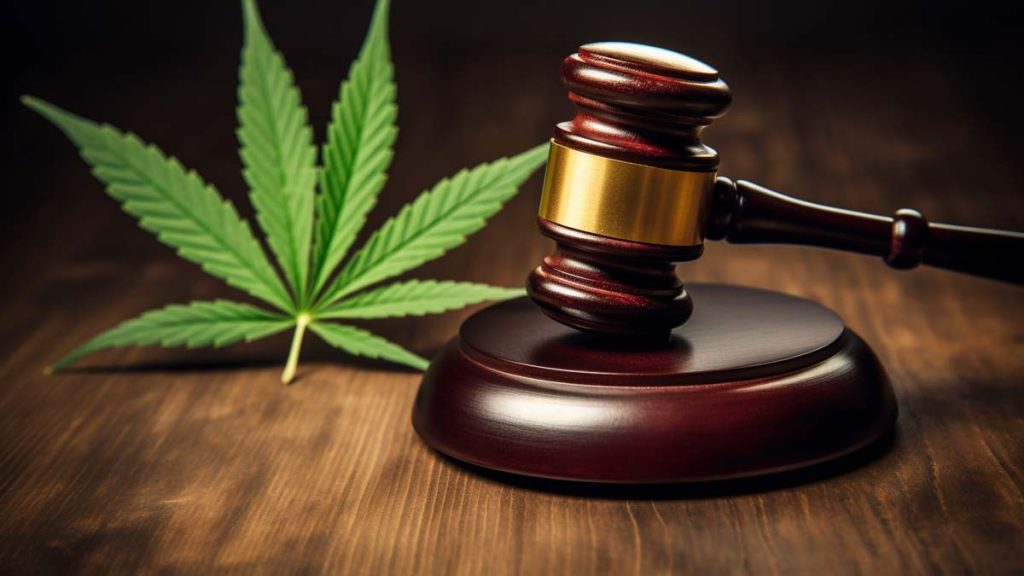When Will Cannabis Be Federally Legal?

This post is part of our Best Dispensary in San Diego series, sponsored by Cannabist.
Can you picture a future where cannabis is no longer stigmatized but instead embraced on a national level? If so, your vision might (eventually) be realized. The conversation around the federal legalization of cannabis has been gaining momentum in recent years, sparking curiosity and hope among advocates and enthusiasts alike. But when will cannabis be federally legal? We’ve got answers.

Table of Contents
- A Closer Look at Federal Cannabis Legalization
- The Current Legal Status of Cannabis in the United States
- A Brief History of Cannabis Legislation
- What’s Holding Back Federal Legalization of Cannabis?
- When Might We See Legal Cannabis at the Federal Level?
- The Ripple Effects of Federal Legalization of Cannabis
- Focus on the Future
A Closer Look at Federal Cannabis Legalization
Federal cannabis legalization is a hot topic that sparks debates across the country. With various states already legalizing marijuana for medical or recreational use, many are wondering when the federal government will follow suit. Currently, the mish-mash of state laws creates confusion and inconsistency in enforcement.
Proponents argue that federal legalization would bring much-needed regulation and oversight to the industry, ensuring product safety and quality standards. It could also open up opportunities for research and development, potentially leading to new medical breakthroughs.
Then again, opponents point out concerns about potential health risks and increased accessibility, especially among young people. They point to the lack of long-term studies on the effects of cannabis use and worry about its impact on public health.
As discussions continue at the federal level, it’s not yet clear how policymakers will navigate these complex issues and ultimately decide on the future of cannabis legalization in the U.S.
The Current Legal Status of Cannabis in the United States

Currently, weed remains classified as a Schedule I drug at the federal level. This means that marijuana is illegal (according to the feds) and considered to be a drug with a high propensity for abuse. Furthermore, marijuana is not acceptable for medical use from the federal government’s point of view.
Despite this progress at the state level, federal legalization remains elusive. The disparities between state and federal laws create uncertainties for consumers, growers, and reputable dispensaries like Cannabist San Diego. This inconsistency highlights the need for comprehensive reform to provide clarity and consistency across all levels of government regarding cannabis legalization.
A Brief History of Cannabis Legislation
Cannabis has a long and intricate history in the United States, dating back to the early 1900s when states began implementing restrictions on its use. The Marijuana Tax Act of 1937 was a significant milestone that effectively criminalized weed at the federal level.
In the 1970s, President Nixon declared a “War on Drugs,” leading to the Controlled Substances Act of 1970. This Act classifies weed as a Schedule I drug alongside substances like heroin. Despite growing public support for legalization in recent years, it wasn’t until 1996 that California became the first state to legalize medical marijuana.
The tide started turning in 2012 when Colorado and Washington became the first states after California to legalize recreational weed fully. Since then, more states have followed suit, creating a patchwork of conflicting state and federal laws that continue to shape the landscape of federal legalization of marijuana.

What’s Holding Back Federal Legalization of Cannabis?
One of the main factors holding back the federal legalization of cannabis is the ongoing stigma surrounding the plant. Despite shifting public opinion and growing acceptance of marijuana use, there are still deep-rooted misconceptions that contribute to resistance at the federal level.
Another barrier to federal legalization is the complex regulatory framework required to oversee a multi-billion-dollar industry. Lawmakers must address taxation, licensing, distribution, and advertising restrictions to establish a comprehensive national cannabis policy.
Additionally, concerns about potential negative impacts on public health and safety play a role in delaying federal legalization efforts. Questions regarding youth access, impaired driving, and substance abuse prevention need to be carefully considered before enacting nationwide legislation.
As you can see, these are valid factors when addressing the question, “When will cannabis be legal federally?” Ultimately, these legitimate concerns and inconsistencies must be resolved through cohesive federal action in order to make progress for nationwide legalization.
When Might We See Legal Cannabis at the Federal Level?
So, when will marijuana be federally legal? That’s a fair question, and many are left wondering when we might see federal action on this issue. There are promising developments that hint at eventual legalization. For instance, the MORE (Marijuana Opportunity Reinvestment and Expungement) Act was proposed to the House of Representatives. This Act was passed in April of 2022, and it decriminalizes weed (removing it from the list of scheduled substances of the Controlled Substance Act). Nonetheless, the Senate remains a hurdle with differing opinions on cannabis reform.
That said, growing public support for cannabis reform and increasing recognition of its economic potential is paving the way for the movement on federal cannabis legalization in the near future. Stay tuned as policymakers continue to navigate this convoluted path toward potential nationwide marijuana legality.
The Ripple Effects of Federal Legalization of Cannabis

Federal legalization of weed would have far-reaching effects on the industry as a whole. With federal backing, businesses operating in the cannabis sector would gain access to traditional banking services. This could potentially enable them to operate more efficiently and securely. This move could also lead to increased investment opportunities from larger corporations looking to enter the market.
Moreover, interstate commerce regulations could open up new avenues for distribution and sales across state lines. Standardized testing and labeling requirements enforced at the federal level may enhance consumer trust and safety standards within the industry.
Additionally, federal legalization might pave the way for comprehensive research initiatives into the medical benefits of cannabis, potentially unlocking new treatment options and pharmaceutical developments. These changes could revolutionize how we perceive and interact with cannabis products in our society.
Focus on the Future
Clearly, the answer to the question of when will cannabis be federally legal isn’t as cut-and-dry as simply passing a bill at the national level. There are a lot of hoops the government still needs to jump through to resolve this perplexing issue.
However, as we look ahead to what promises to be a monumental shift in U.S. drug policy, one thing is certain – when cannabis is finally legalized at the federal level, it will mark a significant turning point in our nation’s history.

Media credits: The conceptual images about when will cannabis be federally legal in this article are copyright of LaJolla.com





